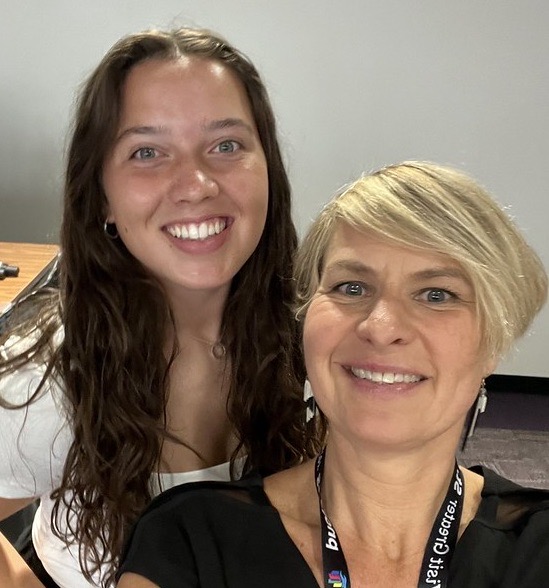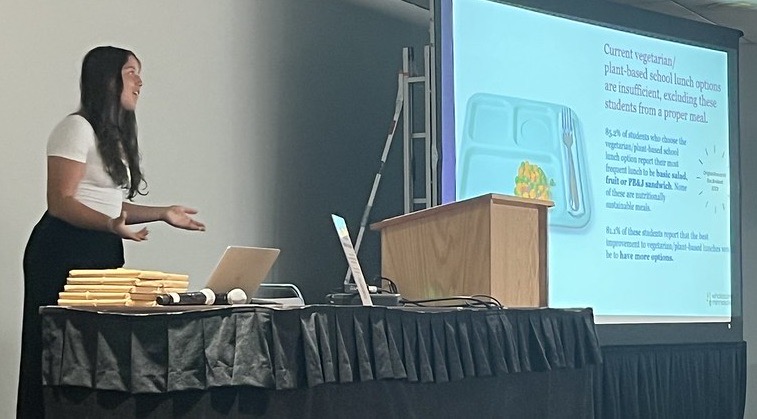By Jodi Gruhn, Wholesome Minnesota Director
August 2023
I attended the Minnesota School Food Association Conference (MSNA) for the first time in 2022. During the conference I noted many opportunities to educate school food professionals about the power of the plant-based plate in school food. After attending in 2022, I created a personal and professional goal that I would earn a speaking slot for the MSNA Conference 2023. I achieved this goal on August 8th!
Wholesome Minnesota’s presentation, “The Power of the Plant-Based Plate”, was built upon leveraging and creating partnerships and relationships. Let me explain…
Knowing that I wanted to immediately capture the attention of our attendees, like any good vegan, I started with food.
A few weeks before the conference I connected with Bobbi Jo Lamar Brunson of Sweet Troo Vi who after a short email exchange agreed we were mission aligned. Sweet Troo Vi donates a portion of their proceeds to benefit local causes with the greatest need throughout the Twin Cities with emphasis on youth programs and aid. They generously donated samples of their AMAZING cookies (seriously if you haven’t had one, your life will not be complete until you do). They were the perfect partner. I heard over and over from the audience- “this is vegan?” Just the point I was trying to make.
It gets better. I did not present alone. In fact, I presented with the most perfect co-presenter I could have ever asked for. This year I partnered with Eva Breiland, a student from Breck School who partnered with Wholesome Minnesota for her Advanced Mathematics Research Project, a final project for her senior year.
Eva worked with her math instructor to design a survey to gauge students’ sentiment about school food. I utilized my relationships with school nutrition directors and teachers I’ve met through my work at Wholesome to get her survey in front of public school students. In the end she had responses from almost 450 students grades 6-12 about their thoughts on school lunch.
We used her survey results to build a custom presentation to demonstrate the “why” and “how” of plant-based meals using data from Minnesota students and it worked remarkably well. Not only because we had local data, but because Eva herself is a vegan who happens to be an honor student and semi-professional athlete. She was able to address obstacles like how one gets their protein needs met on a plant-based diet and also what isolation feels like when there is nothing available for you to eat. She talked about how her choice to go vegan positively affected her family with everyone’s health improving dramatically. All this was done with eloquence and candor. She was relatable and most importantly, represented their target market. Needless to say, they were a captive audience.
We wove Eva’s findings into our presentation. A few examples include:
Having plant-based options signals a respect for students’ values
- 58.6% of students agreed or strongly agreed with the statement: “I care about the well-being of the planet and my environmental impact/footprint”
- It’s possible that more students would eat a reimbursable lunch if there were more options (this makes a school food program more profitable).
- 85.2% of students who choose the vegetarian/plant-based school lunch option report their most frequent lunch to be basic salad, fruit or PB&J sandwich. None of these are nutritionally sustainable meals.
- 81.1% of these students report that the best improvement to vegetarian/plant-based lunches would be to have more options.
We offered a slew of menu options created by our partners at HSUS Forward Food, Friends of the Earth and Chef Ann Foundation.
There is a marketing problem, finding the vegan options is a scavenger hunt. 54.4% of students surveyed responded that they were unaware of vegetarian/plant-based lunch offerings at their school, despite all schools participating having this option regularly.
We gave tips and tricks about food placement, marketing language, sampling events, and veganizing familiar foods. We also talked about how Wholesome helps to build student engagement in with nutrition and environmental education.
The survey results showed that ultimately what students want is a school lunch with healthier, tastier, and more diverse options. In fact, the survey showed that vegetarian/plant-based school lunches had higher satisfaction ratings as compared to normal school lunch. Only 33.8% of students who tried the vegetarian/plant-based option reported being extremely unsatisfied or unsatisfied with their lunch, compared to the 51.6% of the entire student population who were extremely unsatisfied or unsatisfied with their lunch (which is the majority of the student body).
Finally, we discussed what happens if we do not provide an adequate lunch. The survey showed that 83.6% of students eat school lunch occasionally or regularly. However, when these students choose not to eat school lunch, for whatever reason, 54.7% of them skip lunch entirely. Of the students who never eat school lunch (16.4%), nearly half of these students (44.9%) aren’t bringing lunch from home or buying something different, but not eating at all. These students are consistently not eating a meal for the entirety of their school day.
“School lunch is critical to student health and well-being, especially for low-income students—and ensures that students have nutrition they need throughout the day to learn. Research shows that receiving free or reduced-price school lunches reduces food insecurity, obesity rates, and poor health.” Food Research and Action Center
In the end, they had more questions than we could answer. I ran out of business cards as well as Wholesome Minnesota fliers. As I attended sessions throughout the day, I was stopped often by attendees thanking me for the presentation and complimenting me on Eva’s insights.
We are seeing progress:
- It is my understanding in talking to partner organizations from around the country that I may be one of the first representatives from our movement to be accepted to present as a state-wide school nutrition conference.
- This year there were more plant-based vendors than ever.
- I attended a cooking demo session and two of the three demonstrations were plant-based.
- School Nutrition Directors were friendly, many approaching me to introduce themselves–a very different response from last year.
I’m hopeful and very excited to be part of the continued progress in making plant-based foods available to all Minnesota Public School students.


